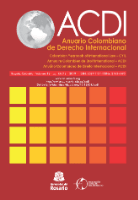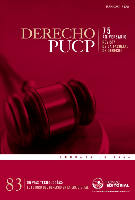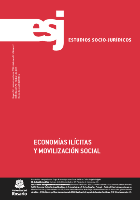
Revista Direito GV
Scope & Guideline
Advancing Legal Discourse, Shaping Tomorrow's Law
Introduction
Aims and Scopes
- Interdisciplinary Legal Studies:
The journal publishes research that integrates law with other disciplines such as sociology, economics, and political science, providing a holistic view of legal issues. - Empirical Research Methodologies:
Revista Direito GV emphasizes empirical methodologies, utilizing data analysis and case studies to explore legal phenomena and their implications. - Focus on Social Justice and Equity:
A consistent theme is the exploration of social justice, addressing issues related to race, gender, and economic disparities within the legal framework. - Legal Innovations and Technology:
The journal covers advancements in legal technology, including the impact of digital transformation on judicial processes, legal practice, and access to justice. - Human Rights and Public Policy:
Research often focuses on the intersection of human rights with public policy, analyzing legal frameworks that protect or undermine these rights in various contexts. - Regional Legal Developments:
Particularly relevant to Brazil and Latin America, the journal highlights regional legal developments, comparative analyses, and the influence of international law.
Trending and Emerging
- Legal Responses to Social Issues:
A growing trend is the analysis of legal frameworks in response to pressing social issues such as discrimination, public health crises, and environmental concerns, showcasing law's role in societal change. - Judicialization of Health:
The topic of health judicialization has gained traction, particularly in the context of access to medication and healthcare services, reflecting the legal system's involvement in health rights. - Impact of Technology on Law:
There is an increasing focus on how technology, including AI and digital platforms, transforms legal practices and judicial processes, indicating an embrace of legal tech innovations. - Environmental Law and Sustainability:
Research on environmental law, particularly concerning sustainable practices and climate change, is emerging as a significant area of focus, aligning with global trends toward sustainability. - Gender and Sexuality in Law:
The exploration of gender and sexuality issues within legal contexts is gaining prominence, particularly in relation to rights, representation, and social justice. - Comparative Legal Studies:
Emerging themes include comparative analyses of legal systems within Latin America, emphasizing the need for understanding regional differences and shared challenges.
Declining or Waning
- Traditional Legal Doctrines:
There appears to be a reduction in articles focused solely on traditional legal doctrines and theories, as the journal increasingly prioritizes empirical and interdisciplinary studies. - Conventional Criminal Law Analysis:
Discussions centered around conventional criminal law without contemporary contextualization are less frequent, indicating a shift towards more innovative approaches to criminal justice. - Focus on Historical Legal Perspectives:
Research that primarily examines historical legal frameworks or doctrines is becoming less common, suggesting a preference for current and forward-looking legal analyses. - Static Regulatory Frameworks:
Articles discussing static regulatory frameworks without considering the dynamic changes in society and technology are less prevalent, reflecting a demand for more adaptive legal studies. - Localized Legal Issues Without Broader Implications:
There is a noticeable decline in studies that focus on localized legal issues without linking them to broader social, economic, or political implications.
Similar Journals

Anuario Colombiano de Derecho Internacional-ACDI
Advancing International Law through Open DialogueAnuario Colombiano de Derecho Internacional-ACDI, published by UNIV ROSARIO, EDITORIAL, is a pivotal open-access journal established in 2008, focusing on the field of international law. Situated in Colombia, this journal serves as a vital platform for scholars, practitioners, and students to disseminate and discuss pivotal legal issues that resonate within an increasingly globalized context. With an impact factor reflecting its relevance—ranking in the Q3 category of law and positioned at the 33rd percentile among legal journals in the Scopus ranking—ACDI is a commendable source for academic research. The journal operates under a rigorous peer-review process, ensuring high standards of scholarly communication. Its commitment to accessibility fosters a broader dialogue among legal professionals worldwide, making it an essential resource for advancing knowledge and discourse in international law.

Cadernos de Dereito Actual
Empowering legal minds with open access research.Cadernos de Dereito Actual is a distinguished peer-reviewed journal published by the University of Santiago de Compostela, focusing on contemporary legal studies and current issues within the field of law. With its open access model instituted since 2013, the journal aims to enhance the accessibility of legal research and foster academic dialogue among researchers, professionals, and students globally. Featuring an ISSN of 2340-860X and an E-ISSN of 2386-5229, Cadernos de Dereito Actual is committed to publishing high-quality articles that contribute to the advancement of legal scholarship. Although specific metrics such as the H-index and Scopus rankings are not currently available, the journal remains a pivotal platform for innovative research and insights within the field of law, promoting rigorous academic standards and interdisciplinary approaches. For further information or to submit your research, please contact the publication service at SERVICIO DE PUBLICACIONES E INTERCAMBIO CIENTIFICO, CAMPUS UNIV SUR, SANTIAGO DE COMPOSTELA 15782, SPAIN.

Revista Brasileira de Direito Processual Penal
Advancing Legal Scholarship in Criminal ProcedureRevista Brasileira de Direito Processual Penal, published by the Instituto Brasileiro de Direito Processual Penal (IBRASPP), serves as a vital open-access platform for scholars and practitioners in the fields of criminal procedure law and social sciences. With an ISSN of 2359-3881 and an E-ISSN of 2525-510X, the journal has been committed to disseminating innovative legal research since its opening access in 2015, thus fostering engagement within legal academia. Based in Brazil and reaching an array of international contributors, it has achieved a respectable Q2 ranking in both Anthropology and Law categories as of 2023, appealing to a diverse audience interested in legal studies, sociology, and the interplay with mental health issues. The journal's ongoing commitment to excellence and impactful scholarship is reflected in its competitive standing across multiple Scopus ranks, making it a significant resource for researchers, legal professionals, and students looking to deepen their understanding of procedural law and its implications in contemporary society.

Ius Humani-Revista de Derecho
Cultivating Knowledge for a Just SocietyIus Humani-Revista de Derecho, published by Universidad Hemisferios, serves as a vital platform for discourse in the field of human rights law and its various dimensions. With an Open Access policy established since 2008, this journal ensures that scholarly articles, critical reviews, and original research are readily accessible to a global audience, fostering collaboration and innovation among researchers, professionals, and students alike. Although the journal is based in Quito, Ecuador, its reach extends internationally, making significant contributions to the understanding and application of human rights in legal frameworks. While it is still developing in terms of its HIndex and Scopus rankings, Ius Humani is poised to provide essential insights and discussions that reflect pressing legal issues and emerging trends in human rights law. Join the community of scholars engaging with this important field through Ius Humani, where knowledge is freely shared and impactful conversations are sparked.

Derecho PUCP
Empowering legal discourse through open access.Derecho PUCP is a distinguished open access journal published by the Pontificia Universidad Católica del Perú, specifically from the Faculty of Law. With a commitment to advancing legal scholarship, this journal has been an essential resource in the field of law since 2005, providing researchers, practitioners, and students with access to critical analyses and discussions on various legal topics. Based in Lima, Peru, Derecho PUCP holds a prestigious position with a Q2 ranking in the Law category, reflecting its impactful contributions to the social sciences, particularly in the legal domain. The journal publishes cutting-edge research and promotes innovative discourse, aiming to foster academic excellence and engage with contemporary legal challenges. As it continues to converge into its future issues from 2019 to 2024, Derecho PUCP exemplifies a vital platform for those committed to the pursuit of legal knowledge and research.

RED-Revista Electronica de Direito
Bridging Theory and Practice in Legal ResearchRED-Revista Electronica de Direito is a prestigious academic journal dedicated to the field of legal studies, published by the CENTRO INVESTIGACAO JURIDICO-ECONOMICA-CIJE in Portugal. Focused on providing a platform for the dissemination of innovative legal research, this journal aims to bridge the gap between theory and practice, covering a wide spectrum of legal disciplines including constitutional, administrative, and international law. Though currently not categorized under Open Access, RED strives to offer thorough and insightful analyses, making it an essential resource for researchers, legal professionals, and students alike. With the growing importance of interdisciplinary approaches in law, this journal serves as a vital conduit for the latest findings and discussions in the legal field, fostering a vibrant academic dialogue among its readership.

Revista CES Derecho
Shaping Tomorrow's Legal Landscape with Scholarly Rigor.Revista CES Derecho is a distinguished academic journal published by UNIV CES, focused on the multifaceted field of law. Situated in Medellin, Colombia, this journal serves as a vital platform for disseminating innovative research and critical analysis in legal studies, encouraging the exchange of ideas among scholars, practitioners, and students alike. With its commitment to open access, the journal provides unfettered access to its content, ensuring that its valuable insights reach a diverse audience. Although specific metrics such as H-Index and Scopus rankings are currently unavailable, the Revista CES Derecho aims to enhance the quality of legal education and practice by fostering scholarly discourse and informing progressive legal thought. Researchers and practitioners are invited to contribute to this dynamic publication, further enriching the discourse in the ever-evolving landscape of law.

Ciencia Juridica
Championing High-Quality, Peer-Reviewed Legal InsightsCiencia Juridica is a distinguished academic journal published by UNIV GUANAJUATO, dedicated to advancing the field of legal studies. With its ISSN 2007-3577 and E-ISSN 2007-6142, this journal serves as a pivotal platform for scholars, researchers, and practitioners to disseminate innovative legal research and analysis. Although currently not an open-access journal, it ensures robust peer-reviewed content that maintains the highest academic standards. By focusing on a comprehensive range of legal topics, Ciencia Juridica aims to contribute significantly to the scholarly dialogue within the legal community, fostering critical thinking and innovative approaches to complex legal issues. The journal's commitment to enhancing legal scholarship makes it an essential resource for anyone engaged in the study or practice of law in Mexico and beyond.

Revista Latinoamericana de Derecho Social
Exploring the Intersection of Law and Social Justice in Latin AmericaRevista Latinoamericana de Derecho Social, published by the Nacional Autónoma de México, Instituto de Investigaciones Jurídicas, is a vital academic resource in the field of Law, particularly focused on social legal issues in the Latin American context. With an ISSN of 1870-4670 and an E-ISSN of 2448-7899, this journal has been actively contributing to legal scholarship since its inception in 2016 and is set to continue until 2024. Although it currently holds a Q4 ranking in the 2023 Law category and is positioned within the 10th percentile of Scopus rankings, the journal offers invaluable insights and rigorous analysis on legal frameworks and practices affecting social justice in Mexico and beyond. Though it operates as a regular publication, researchers and practitioners can access its articles to enhance their understanding of contemporary legal challenges. We encourage scholars, students, and legal professionals interested in social law and the interplay of legal systems in Latin America to consider this journal as a significant avenue for disseminating and engaging with critical legal research.

Revista Estudios Socio-Juridicos
Innovating Research in Law and CultureRevista Estudios Socio-Juridicos is a premier academic journal published by UNIV ROSARIO, FAC JURISPRUDENCIA, dedicated to the interdisciplinary exploration of socio-legal issues. With an ISSN of 0124-0579 and an E-ISSN of 2145-4531, this esteemed journal has transitioned to an Open Access model since 2010, promoting wider dissemination and accessibility of scholarly outputs. Situated in the heart of Bogotá, Colombia, the journal aims to provide a platform for researchers, professionals, and students to share innovative studies and critical analyses that address contemporary challenges in law and society. Although specific metrics such as H-index and Scopus rankings are not available, the journal's commitment to quality research and engagement with pressing social issues solidifies its importance in the field of socio-legal studies. By fostering dialogue and debate, Revista Estudios Socio-Juridicos stands as a vital resource for those seeking to understand the intricacies of legal frameworks in socio-cultural contexts.